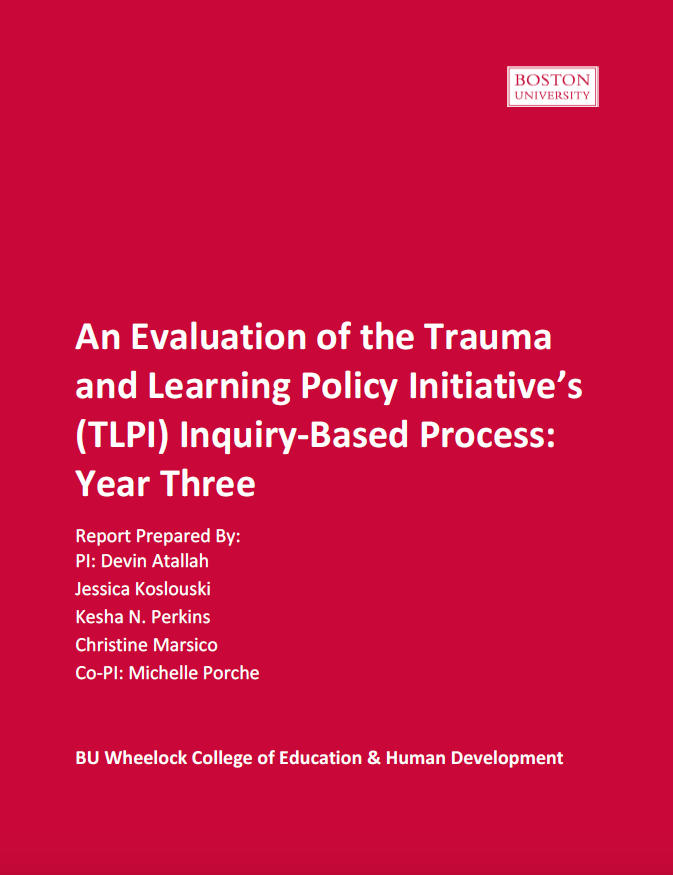
As the world confronts the collective and unprecedented trauma of a public health and economic crisis—exacerbated by systemic racial inequities—understanding the impact trauma has on the ability of children to learn is more important than ever. A new report suggests that schools that have adopted recommendations developed by the Trauma and Learning Policy Initiative (TLPI)—a nationally recognized collaboration between Harvard Law School and Massachusetts Advocates for Children (MAC)—are uniquely positioned to understand and respond to the impact these crises, and the resulting trauma, are having on students, families, and educators.
A recently released report, “An Evaluation of the Trauma and Learning Policy Initiative’s Inquiry-Based Process: Year Three,” published by BU Wheelock College of Education & Human Development, confirms the transformational benefits of a trauma-sensitive school culture as developed by TLPI and set forth in their landmark report, “Helping Traumatized Children Learn: Creating and Advocating for Trauma-Sensitive Schools” (HTCL). Since HTCL was first published in 2005, more than 95,000 copies have been distributed to schools and educators in Massachusetts and across the country.
Over a three-year period, a team of researchers at Boston University studied several Massachusetts schools that have adopted an inquiry based process for creating trauma sensitive schools The team evaluated the efficacy of an inquiry-based process and the sustainability of trauma-sensitive culture changes in the schools that used TLPI’s recommended approach.
The researchers concluded: “Overall, this evaluation provides evidence for profound impacts that schools’ engagement with TLPI’s inquiry-based process, with the requisite level of commitment and focused effort, can have for leadership, staff, students, and families. Lasting changes reported by educators were multi-leveled, and included shifts in both thinking and practice. … This study suggests that, while this transformation may take time and effort to cultivate, the outcomes it generates may be more sustainable than other education reform approaches.”
Susan Cole, a lecturer of law at Harvard Law School and director of TLPI, stated, “Understanding trauma and engaging in a collaborative process of change that brings this understanding into everything we do creates a powerful pathway to helping all students learn both in school and remotely. It was a relief to watch trauma-sensitive schools jump into action as soon as the pandemic occurred. A deep understanding among all staff, combined with leadership and teamwork that prioritizes and values relationships, connection, belongingness, safety, family engagement, and student agency, can enable schools to adapt to any situation with positive results.”
HLS Clinical Professor Michael Gregory ’04, who co-teaches the Education Law Clinic at Harvard Law School with Cole, said: “The significant finding in this study—that an inquiry-based process of change guided by a set of compassionate and equitable values can help educators begin to transform their school cultures in a relatively short period—offers a paradigm change not only for schools but also for legal advocacy. These insights will help to fuel our teaching and our clinic students’ advocacy for years to come.”
The American Institutes for Research (AIR) earlier reported that the first two years of data provided evidence that an understanding of trauma-sensitivity in the context of a process of change can lead to shifts in practice that result in a range of positive outcomes for both students and staff members. Additionally, the AIR researchers found that these new ways of thinking and changes in practice can serve as a foundation for school-wide culture change that enables students and their educators to feel safe and supported to learn and be successful.
The Year Three evaluation provides an evidence base that educators’ deepening understanding of the impact of trauma on learning and participation in a collaborative, inquiry-based process will lead to shifts in thinking that recognize the foundational importance of a welcoming and inclusive learning environment for students’ academic success. Importantly, the evaluation found that school leadership and staff reported cultural and organizational shifts in their schools that clustered into four emergent themes:
• facilitating empowerment and collaboration
• integrating whole‐child approaches
• affirming cultural identity and promoting a sense of belonging
• re‐envisioning discipline toward relational accountability
“The work of building a safe and supportive, trauma-sensitive school community over the last five years has been critical during crises like these,” said a principal of an elementary school studied in the Year Three Report. “When we were initially faced with the pandemic and resulting school closures and shifts to online learning, every single staff member was called to action and immediately prioritized the safety and well-being of all students. They continue to amaze me as they prepare for the new school year this fall to ensure that we not only provide meaningful lessons to keep students engaged in learning, but strive to really connect with students to let them know we truly care about them and will continue to support them and their families in any way we can.”
